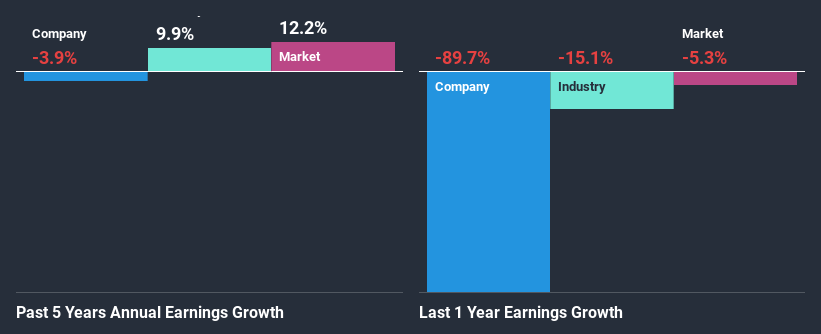Playtech plc (LON:PTEC) Is Going Strong But Fundamentals Appear To Be Mixed : Is There A Clear Direction For The Stock?

Playtech's (LON:PTEC) stock is up by a considerable 41% over the past three months. However, we decided to pay attention to the company's fundamentals which don't appear to give a clear sign about the company's financial health. Specifically, we decided to study Playtech's ROE in this article.
ROE or return on equity is a useful tool to assess how effectively a company can generate returns on the investment it received from its shareholders. Simply put, it is used to assess the profitability of a company in relation to its equity capital.
See our latest analysis for Playtech
How Do You Calculate Return On Equity?
The formula for return on equity is:
Return on Equity = Net Profit (from continuing operations) ÷ Shareholders' Equity
So, based on the above formula, the ROE for Playtech is:
1.1% = €14m ÷ €1.2b (Based on the trailing twelve months to December 2019).
The 'return' refers to a company's earnings over the last year. One way to conceptualize this is that for each £1 of shareholders' capital it has, the company made £0.01 in profit.
What Has ROE Got To Do With Earnings Growth?
So far, we've learned that ROE is a measure of a company's profitability. Depending on how much of these profits the company reinvests or "retains", and how effectively it does so, we are then able to assess a company’s earnings growth potential. Assuming everything else remains unchanged, the higher the ROE and profit retention, the higher the growth rate of a company compared to companies that don't necessarily bear these characteristics.
A Side By Side comparison of Playtech's Earnings Growth And 1.1% ROE
As you can see, Playtech's ROE looks pretty weak. Even compared to the average industry ROE of 8.9%, the company's ROE is quite dismal. Given the circumstances, the significant decline in net income by 3.9% seen by Playtech over the last five years is not surprising. We believe that there also might be other aspects that are negatively influencing the company's earnings prospects. For instance, the company has a very high payout ratio, or is faced with competitive pressures.
However, when we compared Playtech's growth with the industry we found that while the company's earnings have been shrinking, the industry has seen an earnings growth of 9.9% in the same period. This is quite worrisome.
The basis for attaching value to a company is, to a great extent, tied to its earnings growth. The investor should try to establish if the expected growth or decline in earnings, whichever the case may be, is priced in. By doing so, they will have an idea if the stock is headed into clear blue waters or if swampy waters await. One good indicator of expected earnings growth is the P/E ratio which determines the price the market is willing to pay for a stock based on its earnings prospects. So, you may want to check if Playtech is trading on a high P/E or a low P/E, relative to its industry.
Is Playtech Efficiently Re-investing Its Profits?
Looking at its three-year median payout ratio of 48% (or a retention ratio of 52%) which is pretty normal, Playtech's declining earnings is rather baffling as one would expect to see a fair bit of growth when a company is retaining a good portion of its profits. It looks like there might be some other reasons to explain the lack in that respect. For example, the business could be in decline.
Our latest analyst data shows that the future payout ratio of the company is expected to drop to 27% over the next three years. As a result, the expected drop in Playtech's payout ratio explains the anticipated rise in the company's future ROE to 8.8%, over the same period.
Conclusion
Overall, we have mixed feelings about Playtech. While the company does have a high rate of profit retention, its low rate of return is probably hampering its earnings growth. With that said, we studied the latest analyst forecasts and found that while the company has shrunk its earnings in the past, analysts expect its earnings to grow in the future. To know more about the latest analysts predictions for the company, check out this visualization of analyst forecasts for the company.
This article by Simply Wall St is general in nature. It does not constitute a recommendation to buy or sell any stock, and does not take account of your objectives, or your financial situation. We aim to bring you long-term focused analysis driven by fundamental data. Note that our analysis may not factor in the latest price-sensitive company announcements or qualitative material. Simply Wall St has no position in any stocks mentioned.
Have feedback on this article? Concerned about the content? Get in touch with us directly. Alternatively, email editorial-team@simplywallst.com.

 Yahoo Finance
Yahoo Finance 
